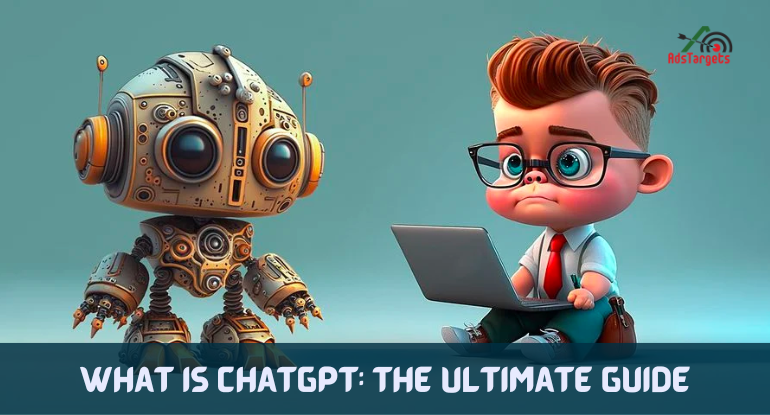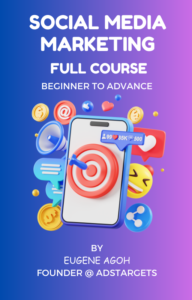There has been so much hype about what ChatGPT can do and how it will influence marketing. As always, the hype is ahead of the curve.
However, when you look at ChatGPT in the context of humanity’s journey to convert data into knowledge, it is indeed a massive leap in capabilities, not unlike how the world changed after we included search engines for the Web.
All I can pause here to say is “Interesting times are ahead”
In this article, I will walk you through all you need to know about this new bride at the heart of our technology.
Table of Contents
ToggleWhat is ChatGPT?
Well, this is the answer from ChatGPT itself:
“I’m like a genie in a bottle, but instead of granting wishes, I grant code solutions. Just rub your keyboard and ask me a question, and I will pop out with the answer faster than you can say “bug-free code.”
“And if you are feeling stuck, don’t worry, I will be your trusty sidekick, like Pikachu to your Ash or Robin to your Batman. Together, we will conquer the coding world one line of code at a time”
Using ChatGPT is like having a professional teaching writer and aid with much of mankind’s knowledge at your disposal.
It’s hard to predict exactly what this means, but it’s safe to say that content creation and learning will never be the same.
Note that I am using content here in the general sense, this is not just about writing essays and content marketing; it also includes writing code.
So does this mean we will all be unemployed in a few years from here? Probably not, but a lot is going to change, like I said earlier, exciting times are ahead.
As always, humans will move up the intelligence food chain from knowledge-based activity to more insight or wisdom-based tasks.
You can get code generated, but you can still improve it to gain an advantage. It can generate marketing content for you, but you can provide the right inputs and add additional insights to optimize it.


Things You Can Use Chatgpt For?
Since language and communication are used for everything, ChatGPT is also proving to be useful for everything.
Some of ChatGPT’s many abilities include:
#1. Write code, marketing copy, articles, stories, poems, emails, essays
#2. Generate ideas and examples, various choice questions
#3. Recommend products, services, movies, anything.
#4. Explain complicated topics using layman’s terms
#5. Analyze sentiment and tone based on punctuation, phrases, and words
#6. Translate text in 95 various languages
#7. Discover data sets and job openings
Given the above starter list, the implications are mind-boggling for any industry. But of course, the one we are concerned with is that of digital advertising.
How Can Chatgpt Be Used in Marketing?
#1. Generate copy for your marketing Campaigns
You can use ChatGPT to help you with creating copy for any of your marketing campaigns: Emails, blog posts, product descriptions, website copy, ad copy, headlines, social media captions, and more.
Just ask it to:
#1. Generate the content
#2. Improve existing content for a particular tone—like to make it more exciting for a particular audience.
#3. Optimize existing content for a goal.
Of course, an entire blog post is a bit of a stretch; don’t ask it to do that for you. You may want to ask for an outline instead of stretching your luck and attempting to stretch the brain of the ChatGPT.
#2. Obtain marketing tool recommendations
But you can also use it to obtain recommendations for marketing tools. After all, there is a vast sea of “top ten” lists for just about any marketing tool out there on the web. For instance, ask about the best keyword research tools.
#3. Provide Content Ideas
There are various ways to use ChatGPT to get ideas for your next blog posts, guides, ebooks, and whitepapers.
You can ask it for content ideas based on topics or existing content, leverage it to perform research on a topic, gather the top articles on a topic, or have it simplify a complicated concept for you so you can simplify it for your readers.
#4. Learn formulas and shortcuts
While you shouldn’t leave it to ChatGPT to do your reporting and analytics, one way it can help you is by teaching you shortcuts that can assist you with data processing and analysis.
For instance, you can ask it for spreadsheet formulas, common expressions, and other strings that are evergreen.
#5. Rich Personalized customer experience
ChatGPT’s natural language processing can generate personalized content for your customers based on their past behavior, preferences, and demographics.
This can help you create tailored content that resonates with your audience, which can lead to higher customer engagement and good conversion rates.
#6. Audience research
Audience research involves gathering data and information about your target market to better understand their interests, preferences, needs, and behaviors.
This information can help come up with more effective marketing strategies, including content creation, ad targeting, and product creation.
ChatGPT can be used to analyze customer information such as:
#1. Search queries
#2. Social media engagements
#3. Past purchases to discover patterns and trends in customer behavior.
By analyzing this data, ChatGPT can help you discover your target audience’s preferences, interests, and pain points, which can inform your marketing messaging and content.


#7. SEO optimization
ChatGPT can be a beneficial tool for SEO in marketing. SEO involves optimizing your website and content to rank higher in search engine results pages (SERPs) for relevant keywords.
Here are some ways that ChatGPT can help on the SEO journey:
#1. Generate compelling topic ideas for content marketing
#2. Conduct keyword research
#3. Find the right and compelling titles
#4. Categorize search intent
#5. Develop content structure
#6. Create meta descriptions
#8. Writing compelling product descriptions
Product descriptions are an important part of marketing, as they offer potential customers with information about the features, benefits, and benefits of a product.
ChatGPT helps you create compelling and informative descriptions that resonate with your target audience.
#9. Chatbot for customer support
ChatGPT can be incorporated into a chatbot to offer instant and personalized customer support. ChatGPT helps customers with frequently asked questions, offers technical support, and even troubleshoots issues. Chatbots in marketing can do the following:
#1. Enhance customer satisfaction
#2. Cut down on response times
#3. Reduce the workload of customer service representatives.
Ways to Not Use Chatgpt For Marketing
#1. Do not ask for marketing strategy Suggestions
While looking for the best ways to promote your business, you may be tempted to ask ChatGPT but to be frank with you, the best marketing strategies for your business are going to depend on your unique marketing objectives and challenges as well as the resources you have.
#2. Don’t Allow Chat GPT to organize your Google Ads account structure
While you can leverage ChatGPT to help with headlines and descriptions writing for your Google Ads, leave the strategic stuff up to the professional. Do not because the cost of engaging a professional fall back on the shoulders of chatgpt to organize your account structure.
For instance, some have recommended using Chat GPT to organize your Google Ads account structure, but I do not recommend it.
#3. Do not use Chat GPT for competitor analysis
A SWOT analysis examines the strengths, weaknesses, opportunities, and threats of a competitor in your business.
Again, ChatGPT’s data is not the most recent, and it is dependent on aggregating a bunch of text data from across the web.
It does not have context. So while it may cough out some good information about your competitors, you are better off running the analysis using real-time platforms and apps.
Limitations of ChatGPT
#1. Lacks common sense
While ChatGPT can come up with human-like responses and has access to a large amount of data, it does not possess human-level common sense and the model also lacks the background knowledge humans have.
This means that ChatGPT may sometimes offer nonsensical or inaccurate responses to certain questions.
#2.Lacks emotional intelligence
While ChatGPT can generate responses that appear empathetic, it does not have true emotional intelligence.
It cannot detect subtle emotional cues or respond accordingly to complex emotional situations.
#3. Limitations in understanding context
ChatGPT has a difficult time understanding context, especially humor, and sarcasm. While ChatGPT is seasoned in language processing, it can struggle to understand the subtle nuances of human communication.
For instance, if a user were to use humor or sarcasm in their message, ChatGPT may fail to pick up on the intended meaning and rather provide an inappropriate response.
#4. Trouble creating long-form, structured content
At the moment, ChatGPT has some trouble generating long-form, structured content. While the model can create coherent and grammatically correct sentences, it may struggle to create long pieces of content that follow a particular structure, narrative, or format.
As a result, ChatGPT is currently best fitted for generating shorter pieces of content like summaries, brief explanations, or bullet points.
#5.Limitations in handling multiple tasks at once
The model performs well when it is given a single task or objective to concentrate on. If you ask ChatGPT to perform multiple tasks at once, it will grapple to prioritize them, which will lead to a reduction in effectiveness and accuracy.
#6. Potentially biased responses
ChatGPT is trained on a large set of text data and that data may contain biases or preconceptions. This means the AI may sometimes generate answers that are unintentionally biased or discriminatory.
#7. Limited knowledge
Although ChatGPT has access to a large amount of data, it cannot access all of the knowledge that humans have.
It cannot answer questions about very specific or niche topics, and it may not be aware of recent developments or changes in certain industries.
#8. Accuracy problems
ChatGPT’s sensitivity to typos, misspellings, and grammatical errors is limited at the moment. The model may also produce responses that are technically correct but may not be entirely accurate in terms of context.
This limitation can be especially challenging when processing complex or specialized information, where accuracy and precision are important. You should always make efforts to verify the information ChatGPT generates.
#9. Need for fine-tuning
If you need to use ChatGPT for specific use cases, you may need to fine-tune the model to get what you desire.
Fine-tuning involves training the model on a specific set of data to improve its performance for a particular task, and this can be time-consuming and resource-intensive.
#10. Computational costs and power
ChatGPT is a highly complex and complicated AI language model that requires substantial computational resources to operate efficiently which means running the model can be expensive and may require access to specialized and sophisticated hardware and software systems.
Conclusion
Technology and artificial intelligence have infiltrated almost every industry imaginable. For better or worse, AI is here to stay and it’s only getting smarter.
In 2022, OpenAI, an artificial intelligence (AI) research and Development Company, developed a tool called ChatGPT.
This tool has the potential to change even more about each industry as head into the future, even the marketing and advertising industry as captured in this article has a lot of goodies to draw out of this new technology on the block.
The article underpinned the meaning and uses of the Chhttps://www.youtube.com/watch?v=bSvTVREwSNwatgpt tool and also where it should not be used in your marketing efforts.
Finally, Take a look at how ChatGPT works below in the video.




